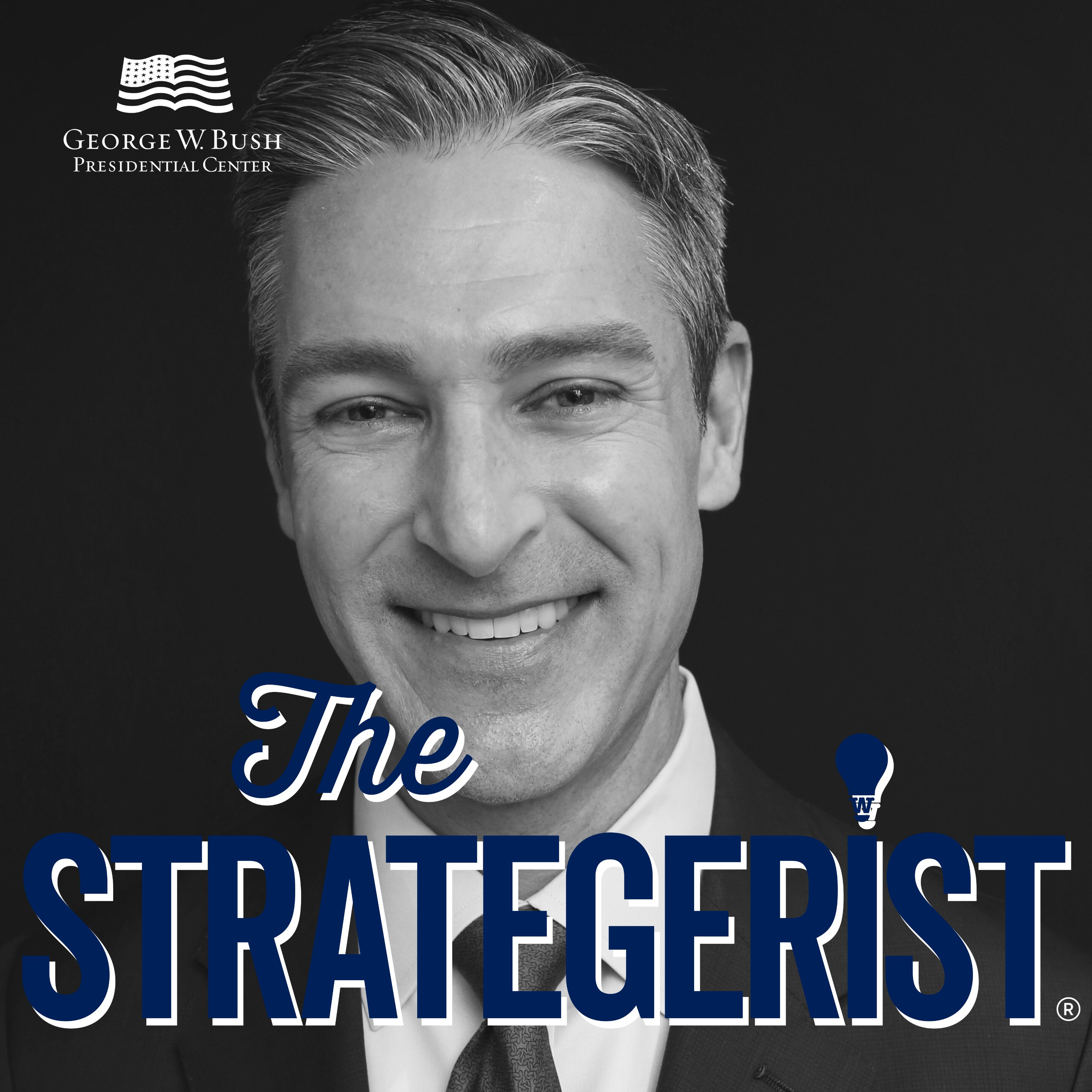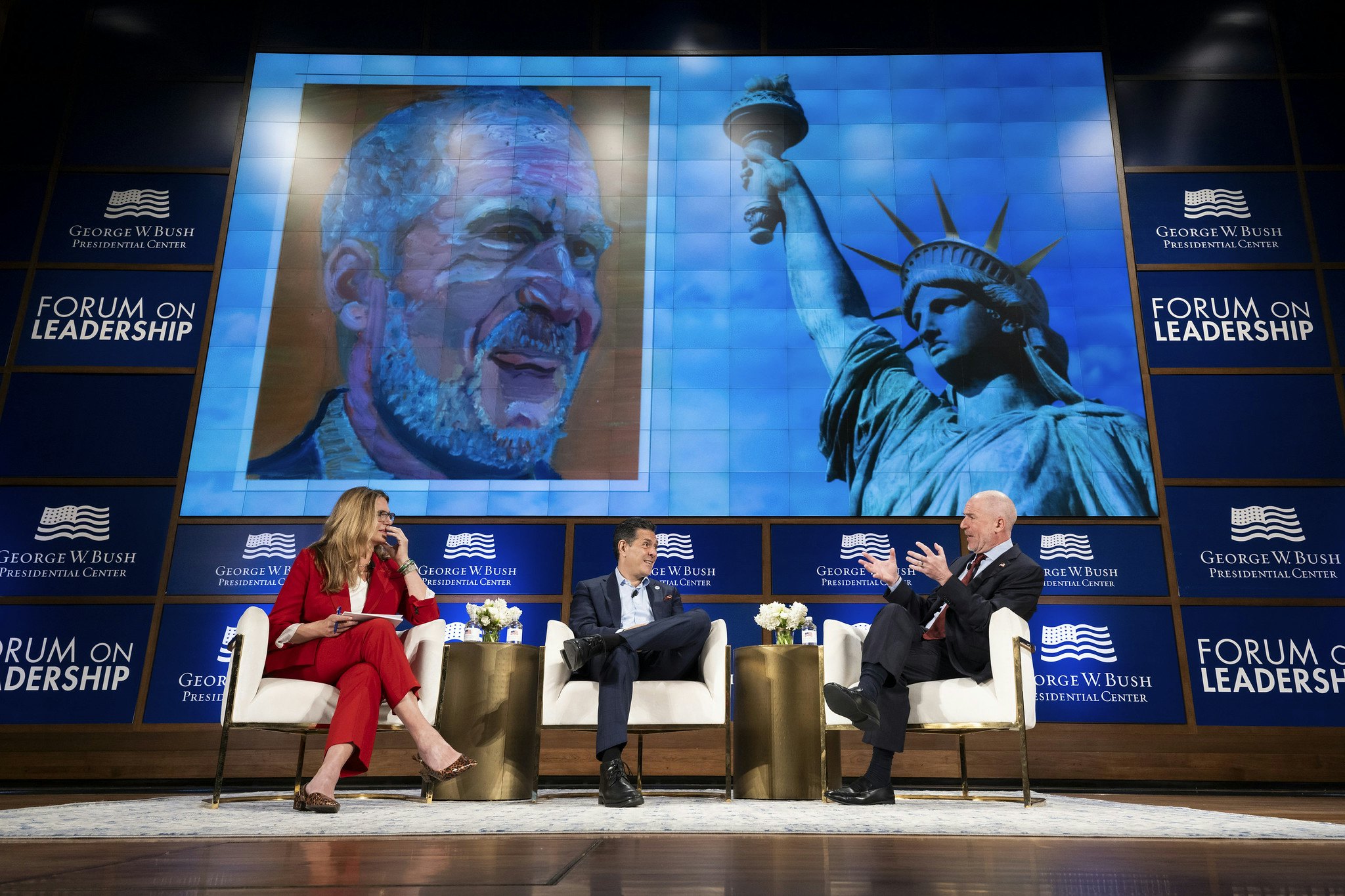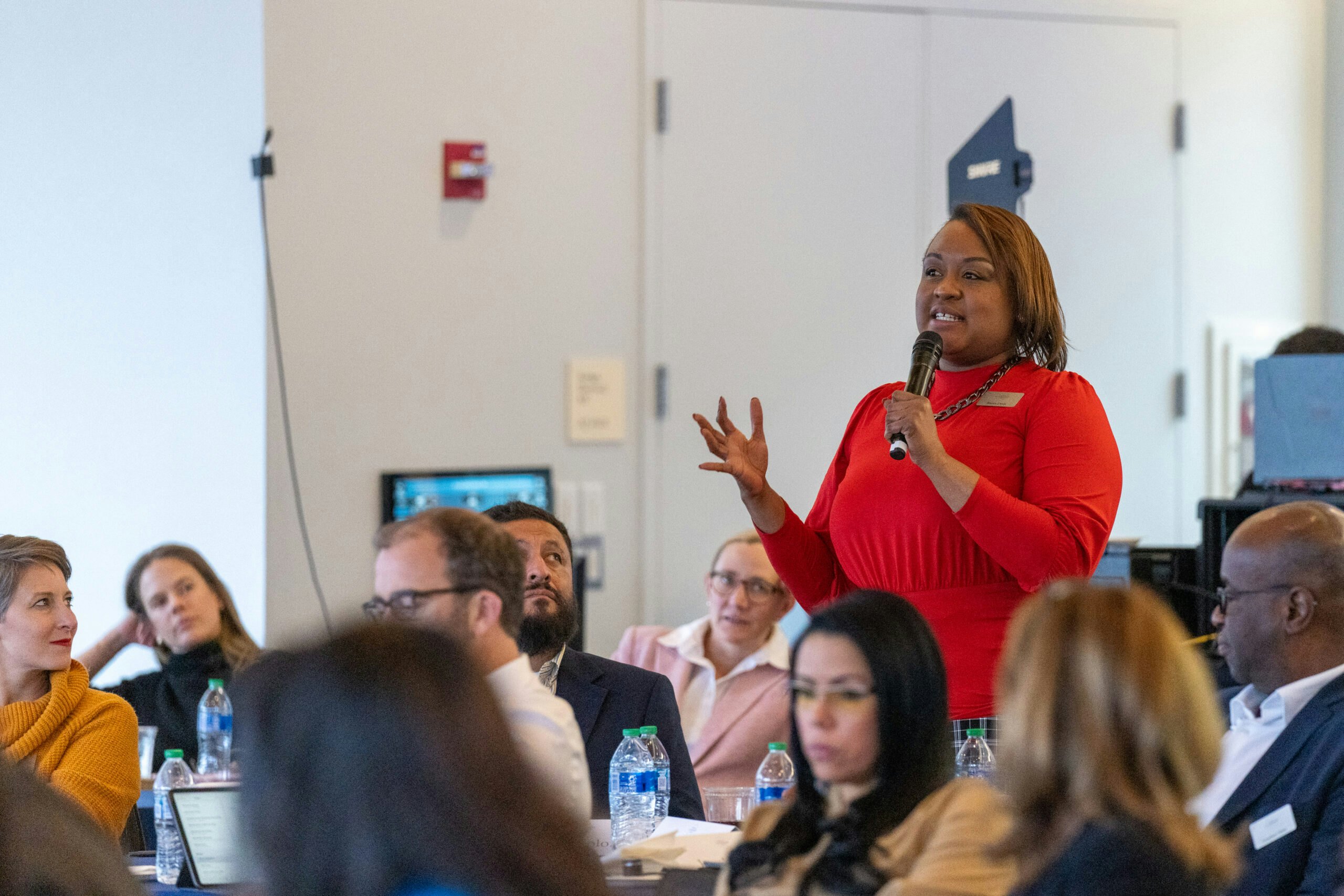Peter Wehner, a Senior Fellow at the Ethics and Public Policy Center. and E.J. Dionne Jr., a Washington Post Syndicated Columnist, address the relationship between religious freedom and democratic stability.
Peter Wehner and E.J. Dionne Jr. write frequently about religious freedom in their roles as political commentators and policy experts. Wehner, who served in President George W. Bush’s administration, is a Senior Fellow at the Ethics and Public Policy Center, a contributing opinion writer for the New York Times, and a contributing editor for The Atlantic. Dionne is a Washington Post Syndicated Columnist, a Brookings Institution Senior Fellow, and a Georgetown University professor.
The pair addressed the relationship between religious freedom and democratic stability in this conversation with Lindsay Lloyd, the Bradford M. Freeman Director of the Human Freedom Initiative at the George W. Bush Institute, Chris Walsh, Senior Program Manager in the Human Freedom Initiative, and William McKenzie, Senior Editorial Advisor at the Bush Institute. In a time of political polarization, Wehner and Dionne showed how respectful conversation can occur about our understanding of the Constitution and about modern issues like the rise of young Americans with no religious beliefs, debates over the COVID-19 vaccines, and the need to temper our own beliefs with humility. Excerpts from their exchange are presented in the accompanying video and text, the latter of which has been edited for length and clarity.
How do you define religious freedom?
Wehner: The country and the courts have wrestled with this throughout a large part of our history. But I understand religious freedom in the American context to be that people of faith have a large degree of freedom to practice their faith in the manner that is most consistent with their beliefs as long as it doesn’t intrude on the rights of others.
The way that it’s manifested in the American Constitution is in the Bill of Rights, and the Free Exercise Clause and the Establishment Clause. Those are the twin poles of how the Founders tried to balance the First Amendment, saying that there’s no law respecting the establishment of religion or prohibiting the free exercise thereof.
Those are the elements they tried to get right, particularly within the context of the history that they had come out of and had experienced. There was this notion that religion exists and it has to be taken into account, and it can do great good, but it can also do great harm. They had to thread that needle and get the government in a situation that it could admit and acknowledge religion exists and is important, while also keeping it contained from doing real damage.
Dionne: I broadly agree. What Pete said at the beginning is important: We have to be aware of the imperative to defend religious freedom but in ways that avoid infringing on the rights of others. That’s where this question always gets complicated.
Religious freedom is best viewed in the context of the entire First Amendment, which I pulled up here so I could read it and put it on the record: “Congress shall make no law respecting an establishment of religion.” That part comes first in the religion clause. Then it says, “Or prohibiting the free exercise thereof.” That is followed immediately by, “Or abridging the freedom of speech or the press or the right of the people peaceably to assemble and to petition the government for a redress of grievances.”
So, first, the Founders put religious liberty in the context of a broad array of rights to free self-expression. The religious right has to be seen in the context of all those other rights. Secondly, the two religion clauses are sometimes in tension with each other. I used to assign students an essay question, “Do the religion clauses reinforce each other or contradict each other – or both or neither?”
What we’ve seen lately is controversy over one side claiming that X or Y is about my religious liberty, and the other side saying, “No, that is an attempt to establish your religion in law.”
The Founders made religion the first right mentioned in the First Amendment for a couple of reasons. You can define religion in many ways, but let’s take Paul Tillich’s definition: religion as “ultimate concern.” If a citizen isn’t free to express and be loyal to his or her ultimate concern, that is a problem for free government.
So, first, the Founders put religious liberty in the context of a broad array of rights to free self-expression.
But the Founders also had, as Pete mentioned, the memories of the religious wars of the 16th century in their heads even more than we do today. The political philosopher Judith Shklar referred to “the liberalism of fear” – a fear that the religious wars might arise again. The Founders did not want us to go around shooting and killing each other because of our religious beliefs.
So, basically in agreement with Pete, this is a very strong right embedded in the Constitution, but it’s not a trump card to every other right. To give one obvious example, you cannot discriminate against others on the grounds of race or gender, just because you say, “My religious beliefs tell me to.”
The courts have ruled that’s not the case, and now we are having fights in the country over whether that same logic should apply to LGBTQ people. I don’t think that’s alarmist, I think LGBTQ people are looking at what we’ve done in the past with the rights of Black people and women and saying, “We should be under that same umbrella.”
But yes, these things are contested. As long as we are contesting these things, we will be a free country.
Wehner: The points E.J. made are right and well stated. The Constitution does single out religion for different treatment in the First Amendment. It’s not just a subcategory of speech, and that is notable. I think that’s intended. I also think that there is intentional tension in the Establishment Clause and the Free Exercise clause.
This is a complicated issue for the reasons E.J. articulated. They wanted to get this right and stay within certain parameters. And it’s interesting that the Founders did not say there was no national religion, which they could have done. They went beyond that and said that pretty much no government involvement with religion at all, even on the non-preferential basis.
That gets complicated in particular court cases, but when you read the writings of John Locke, it was clear that they were trying to avoid the religious wars of the past. That was the danger that they were confronting. It wasn’t something that was episodic, it was specific to that period.
This is a dilemma throughout human history because it’s a part of human life. If you look at how religion has torn apart different regions of the world at different times, the American experience is pretty good when it comes to getting that balance right.
Dionne: We’ve torn ourselves apart over other things.
Sure enough, sure enough. So, what impact does religious freedom or the lack of it have on the stability of a country or society?
Wehner: Religious freedom has a huge amount to do with the stability of a society for some reasons that we have talked about. If you don’t get religious freedom right, it can tear a country apart.
You see it in the Shia-Sunni split. You see it in the wars of the European continent for several centuries. You see it with the Protestant and Catholic divisions in Northern Ireland.
If you don’t get this right, you can get a lot wrong. The lack of religious freedom can create wars and death and deep divisions.
Religious freedom has a huge amount to do with the stability of a society for some reasons that we have talked about. If you don’t get religious freedom right, it can tear a country apart.
But there’s a positive element as well. For many people of faith, religion is central or at least important to who they are. They feel the need to have the capacity to be able to follow their religious beliefs and worship as they want, pray as they want, host Bible studies if they want, and give expression to those deep beliefs.
If you don’t have a proper understanding of human anthropology, you set yourself up for wreckage. People have to acknowledge that religion deals with fundamentally important and ultimate things.
If you’re constructing a constitution, a government, or a society, you have to take into account certain human realities and try and construct a system that minimizes the worst and amplifies the best.
Dionne: I want to add to where we left off the last time in answering this question. Our tradition has worked pretty well on this question, but we shouldn’t gloss over extreme religious conflict in our history. It’s often been tied to immigration.
When Irish Catholics began coming into the country in the 1840s, there was an enormous backlash from white Protestant Americans. There were riots in Philadelphia over how religion should be taught in the schools, even getting down to the question of which version of the Ten Commandments should be taught in schools. There are the Blaine Amendments in many state constitutions which prohibit aid to Catholic parochial schools.
Similarly, there was a backlash against immigration from the 1880s to the 1920s, which brought in large numbers from Eastern Europe, including Eastern European Jews. There was the rise of the Klan in the 1920s, and we’re seeing a comparable backlash again today. We have seen it against Muslims immigrants from around the world, both not only from the Middle East, but also from Asia.
So, religious freedom is inextricably linked to our attitudes towards the other. That includes not only people with different religious views from us, but different skin colors, different national origins.
We keep struggling with this, and, on the whole, we’ve come out better than worse on these questions. Catholics were eventually fully accepted to the point where our Supreme Court is now dominated by Catholics.
The other thing I’d say is that we went through a period of an informal establishment of Protestantism as the dominant religion in the United States, not legally, but culturally. Cultural Protestantism was very important to the country, but that began to break down particularly with the great immigration of the period between 1890 and 1920. We’ve been struggling with the cultural disestablishment of Protestantism ever since.
We’re still living in the time of COVID, so what do you think about how people of faith balance their allegiance to the Divine with their commitment to the common good? It seems to me those two should be more complimentary than they are in tension, but I would love to hear what you think.
Dionne: I’m afraid I don’t see that conflict. It really troubles me that people are inventing the conflict. Yes, there has been some debate about the origins of the vaccine in stem cell research, but in virtually all of our traditions, including the Catholic tradition – and including Pope Francis – theologians have stated that taking the vaccine does not violate the pro-life principles of anyone.
Beyond that, there’s a lot of made-up stuff that is rooted not in religion, but in political divisions that happen to coincide with religion.
The obligation to take the vaccine is profound, because you can see the damage failing to take it is causing in the parts of the country, the lives being lost in the parts of the country where large numbers of people are unvaccinated.
On the edges you might have some issues with, say, Christian Scientists who are opposed to all forms of medicine. I get that there may be some exceptions, but I don’t hear, and perhaps I’m missing something, I don’t hear terribly coherent religious arguments against taking the vaccine. I see arguments largely rooted in partisan politics rationalized in religious terms, and I find it very troubling because that kind of argument is causing a lot of sickness and death.
Wehner: The reason that you don’t hear a coherent argument is that it doesn’t exist. The idea that there’s any religious basis for not taking a life-saving vaccine is completely made out of whole cloth. I say this in the most respectful way possible, it just doesn’t exist.
But this goes to a deeper issue, which has been a real concern of mine and, I think, E.J.’s as well, and that is politicized religion. As a person of the Christian faith, the degree to which religious faith is subordinated to political ideology, to sociology, to cultural issues, culture war politics, is striking and disturbing.
Faith is being deformed and manipulated and used as a weapon to advance beliefs that have nothing to do with faith. Political ideology is the lens through which many people interpret faith.
The trouble is that because of human nature and our blindness to so many things that we all struggle with, people believe that things that I would argue are completely disconnected from faith. Sometimes it is antithetical to what their faith teaches them to do. This gets very complicated in terms of how you deal with this in a society.
Faith is being vulgarized and harmed to an extraordinary degree. That’s happening mostly on the right, although both sides have those temptations.
To the broader point of allegiance to the Divine and the common good, I don’t see them in tension at all. A commitment to the Divine would be almost by definition a commitment to the common good. If you reach a situation in which those are in conflict, then it’s worth asking some serious questions about whether I’ve got something wrong in terms of what I imagine my commitment to the Divine might be and how it might manifest itself, because faith itself properly understood is about advancing the common good.
Faith is about doctrine, and many, many things. But what Protestants and others refer to as common grace, exists. I don’t see them in tension, and they certainly shouldn’t be, in my view.
Dionne: I will paraphrase a great C.S. Lewis line about the person who doesn’t look to scripture for guidance on how he or she might think about political questions, but rather ransacks scripture for support for his or her own political party. In the case of the vaccine, this is an example of ransacking scripture for support for points of view that both of us believe are not supported by scripture.
But we have also defended the right of religious people to enter the public square and make their case with reference to religious beliefs. So, there’s a sub-argument we need to have: How can you judge what one person might define as “discernment” while another would call it a “distortion.”
Pete and I would probably agree on 90% of the cases where that’s involved, but there is a tension within what we’re saying. I suppose this is where a sermon about humility might be in order – and a reference to Reinhold Niebuhr’s excellent advice that we should look for the truth in our opponent’s error, and the error in our own truth. Also in order: My own confession that this is something that is becoming harder and harder to do in the current political climate.

























